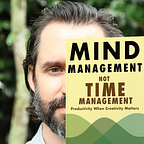“Slow Work” makes great work come easily
It’s tempting to want to get everything done fast. But sometimes, it’s better to do your work slowly. This is especially important for creative work.
When you build a habit of doing a small amount of work on a project, you give yourself incubation time in between sessions. The creative work that you could have never managed to accomplish in a single session, becomes quite easy to produce over time.
In many things, it’s tempting to push yourself to your limits, but with Slow Work, you have to trust that progress is being made, slowly, over time.
I once joined a gym, and got a free training session with a personal trainer. He spent 90 minutes coaching me through set after set, pushing me past exhaustion, assisting a couple last reps into every set.
This is called overtraining. I was so sore for the next week, I couldn’t straighten my arms. I didn’t take any more sessions with that trainer, and it was awhile before I could bring myself to go back to the gym.
You’ve probably overtrained on a project before. You sit down, and try to write a book, or even just a blog post. You don’t have a plan for how it will get done — you just want to get it done.
Eventually, you burn out. You can hardly bear to think about that project anymore. You associate it with too much pain. The Resistance is too strong.
You were enjoying it at the point where you had given 80% of your potential effort. It was that last 20% that gave you the bad taste in your mouth.
The world-record-breaking Russian powerlifters of the 60’s — 90’s didn’t train until exhaustion. Instead, they lifted regularly, gave themselves lots of rest between sets, and left the gym feeling they had the energy to do more.
As the strength coach Pavel Tsatsouline describes, “working out” is a bad word. It implies that you are going to exhaust yourself. Instead, it is a “practice.” Do many sets at 70–80% of your maximum effort, and, over time, you just get stronger.
Similarly, Ernest Hemingway is famous for stopping a writing session while he still had some in the tank.
I overtrained when I wrote my first book. I just tried to power through each chapter. I spent 12 hours a day banging my head against the wall, just to get 15 minutes of flow, wherein I would complete an entire day’s worth of writing. I started staying in bed until noon, because I dreaded getting up to write again.
Eventually, I learned the power of Slow Work. I broke my writing up into component parts, based upon the mental effort required for Prioritization, Generation, Research, Exploration, and Detail, and I built a habit of working through those components.
In Stephen King’s On Writing, he recommends that you write the first draft of your book, then hide it in a drawer for 6 weeks. Your second pass will be better if you give it time to marinate.
When you give yourself an incubation period between sessions, magically, everything becomes clearer. As neuroscientist John Kounios described on my podcast, strong connections solidify in your brain, and the weak ones crumble.
Study participants who were given a set of facts, then given an incubation period, made connections between those facts more quickly. Similarly, if you give yourself time between sessions, suddenly, you’ll make connections where you didn’t see them before, and find a replacement for that awkward metaphor.
Here are some ways you can start using Slow Work to do better work with less exhaustion.
- Think in “Layers.” If you’re writing, you don’t just sit down and write. Researching, outlining, or just exploring related material are all different “layers” of thinking. If you switch between them too much, you’ll exhaust yourself. Try to stay on one layer. If you’re writing a draft [put facts in brackets] instead of stopping to Google.
- Build the habit first. Working to exhaustion is not essential, but consistency is. Concentrate on building a habit with a ridiculously easy goal first, then build upon that. If you’re a writer, publish a 100-word Medium article at the same time every day. Sound too easy? That’s the point.
- Work with your energy cycles. Through enough practice, you’ll recognize the peak time of day—or peak time of week—for the various components of your work. Arrange your work accordingly.
If you build an enjoyable practice of working, you will get stronger, and the work will come easier.
Learn more about creating the conditions for insight in my podcast interview with neuroscientist John Kounios »
